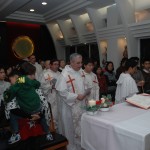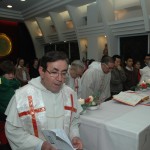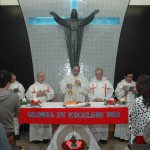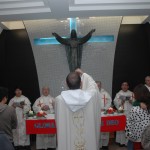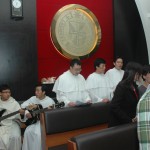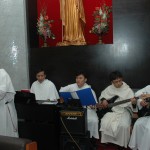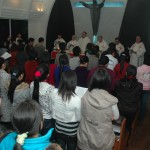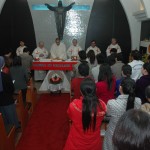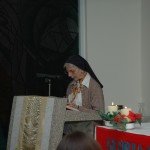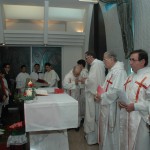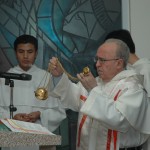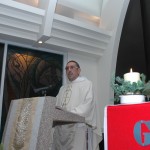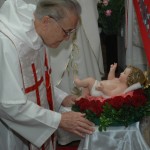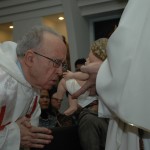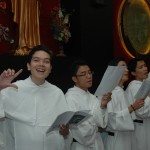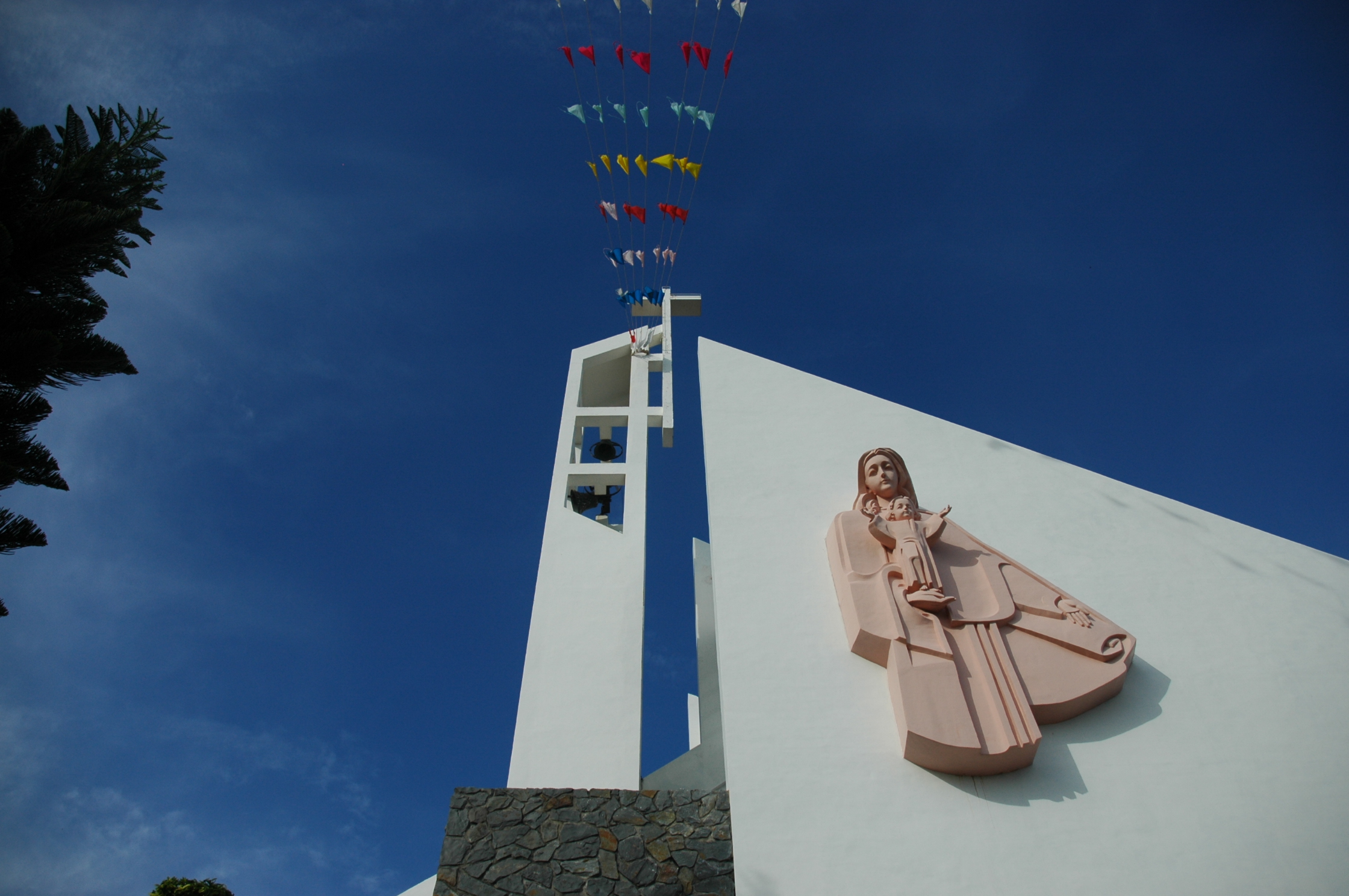
JANUARY 1:
NEW YEAR, DAY OF PEACE AND OF THE MOTHER OF GOD
 For us Christians, the first day of a New Year calls our attention to three points: the New Year, the World Day of Peace and the Feast of Mary as Mother of God.
For us Christians, the first day of a New Year calls our attention to three points: the New Year, the World Day of Peace and the Feast of Mary as Mother of God.
NEW YEAR
On the first day of every New Year, we wish happiness to our relatives and friends – and to all! Yes, may we all have a Happy New Year!
Charlie Brown, the friend of Snoopy, asked Linus (of the wonderful Peanuts Family): “What is happiness?†The understanding of happiness by the world is always connected, if not identified with money, power, pleasure, fame and glory. The understanding of happiness by Jesus is diametrically opposed to that of the world. For Jesus Christ, happiness is spiritual poverty, mercy towards the suffering and needy, work for justice and peace.
Perhaps, for most people the meaning of happiness is to have a meaning for living. For many people – as it is made clear in different world-wide surveys – the meaning of life is to love – and to love more! As young Cathy Rhodes puts it: Give more that what you take…Love more. Don’t be bitter. Forgive, forgive, and forgive.†Happiness, someone wrote, is the unconditional donation of what has been unconditionally given.
Indeed, to live is to love and to love implies not just to love our family and friends, but to love all. If love is selective it cannot be true love; this includes love of all neighbors, in particular the suffering and poor – and even the enemies!
Selfishness or the fat ego is a source of envy, pride, anger, insensitivity to others – of unhappiness.
For the followers of Jesus, blessed – or happy – are the poor in spirit, the merciful, and the pacemakers, those suffering for the sake of justice. For Christians, the Eight Beatitudes of Jesus (see Mt 5:1-12) are eight forms of happiness. Truly for those who believe in God – the majority of people – happiness is happiness with others and for others, for “to be a human being is to be a fellow human being†(M. Buber).
WORLD DAY OF PEACE
In a world of injustice, violence and wars, there can be no full happiness without peace. And there can be no peace but by peaceful means to peace. To underline the need of peace in our world, the Christians since 1966 celebrate every first day of the New Year the World Day of Peace. The celebration is highlighted by the Pope’s Message for the World Day of Peace. This year of 2011 Pope Benedict XVI delivers his Message on “Religious Freedom, the Path to Peace.†We reflect briefly on this papal message.
Peace means living together in justice and love. Its four columns are, beside justice and love, truth and freedom. Freedom, or the power to do good includes necessarily religious freedom, which is an essential component of genuine human freedom. Religious freedom entails the profession of their religion individually and in community by billions of people throughout the world. Rooted in human dignity, and radically in God, religious freedom is with life a basic human right, and therefore it demands respect – reverence and esteem – by all human beings. Respect of religious freedom is “a condition for the moral legitimacy of every social and legal norm†(no. 2). Indeed, religious freedom is the path to peace, an authentic weapon of peace (no.15).
Religion and its varied expressions and manifestations must not be marginalized, much less prohibited from social life. Different religions contribute substantially and positively to society, the common good and the ethics of a good life. On the other hand, the exploitation of religious freedom for fanatical or fundamentalist practices is deeply harmful to social life and cannot be justified but strongly condemned. Similarly, the political and social hostility to and rejection of religions as well as imposition of a religion should also be condemned (nos. 6-8).
For her part, the Church respects “the positive secularity of state institutions†(no. 9), and accepts gladly all that is true and holy in all other religions (no. 110). She constantly asks Christians to consider and treat all others as brothers and sisters in Christ and encourages them to work with all towards the building of a just, fraternal and peaceful society.
Before closing his profound and meaningful message, Benedict XVI expresses his affection for the Christian communities suffering persecution throughout the word – in Asia, Africa, the Middle East especially the Holy Land. Violence, he adds, is “not overcome by violence†(no. 14). Moreover, our Pope is hopeful that the West and particularly Europe end their hostility and prejudice against Christians. Benedict XVI concludes: “May all men and women, and societies at every level and in every part of the earth be able to experience religious freedom, the path to peace†(no. 15). As Christians, let us heed and carry out individually and in community the urgent call to peace of Pope Benedict XVI.
MARY, MOTHER OF GOD
The Church celebrates the Motherhood of Mary, Mary as the Mother of God, on January 1 of every year, that is, the Octave of Christmas and the first day of the New Year.
The Annunciation to Mary is proclaimed to us thus: Mary said to the archangel: “Let it be†(Lk 1:26-38). Yes!  “When the appointed time came, God sent his Son, born of a woman…†(Gal 4:4-5). St John the Evangelist speaks of Mary twice in his Gospel: Mary at Cana, and Mary at Calvary, and in both cases, the Evangelist presents Mary as the Mother of Jesus. In a deep sense, the expression tells us everything about Mary. The motherhood of Mary is the source of all her privileges and graces: she was conceived without original sin (she is the Immaculate Conception); she was taken up to heaven in body and soul (the Assumption of Mary); she is Virgin and Mother!
Mary, the Mother of God. This is how she is called through the first centuries of Christianity. In the Council of Ephesus (431), Mary is dogmatically declared by the Church “Theotokos,†that is, God’s Mother. Vatican II tells us: “Mary is the Mother of God and the Mother of the Redeemer, and, therefore, she surpasses all other creatures in heaven and on earth.†In the Church, “she is the highest after Christ and yet very close to us†(LG, 54). Mary is the Mother of Jesus, who is the Son of God and the Son of Mary: “She conceived, brought forth and nourished Christ; presented Him to the Father in the temple, and was united with Him in suffering as He died on the cross†(LG, 61). Mary is, certainly, the Mother of the Child Jesus, and also the Mother of the Crucified and Risen Lord.
How can Mary, a creature, be the Mother of God, the Creator? Fr. Garrigou-Lagrange explained: “Mary is the Mother of Jesus who is God. Certainly she did not give Him His divine nature, but only His human nature. She is Mother, however, not precisely by reason of the humanity of Jesus, but by reason of the Incarnate Word: Motherhood does not end in the nature, but “in the person possessing this nature, in this case the Person of God.â€
As we wish all a Happy New Year and try to become more peacemakers in our world, we ask Mary the Mother of God and our Mother to bless our brothers and sisters as we pray to her confidently: “Holy Mary, Mother of God, pray for us sinners now…â€
FR FAUSTO GOMEZ BERLANA, OP
St. Dominic’s Priory
(Posted December 26, 2010)
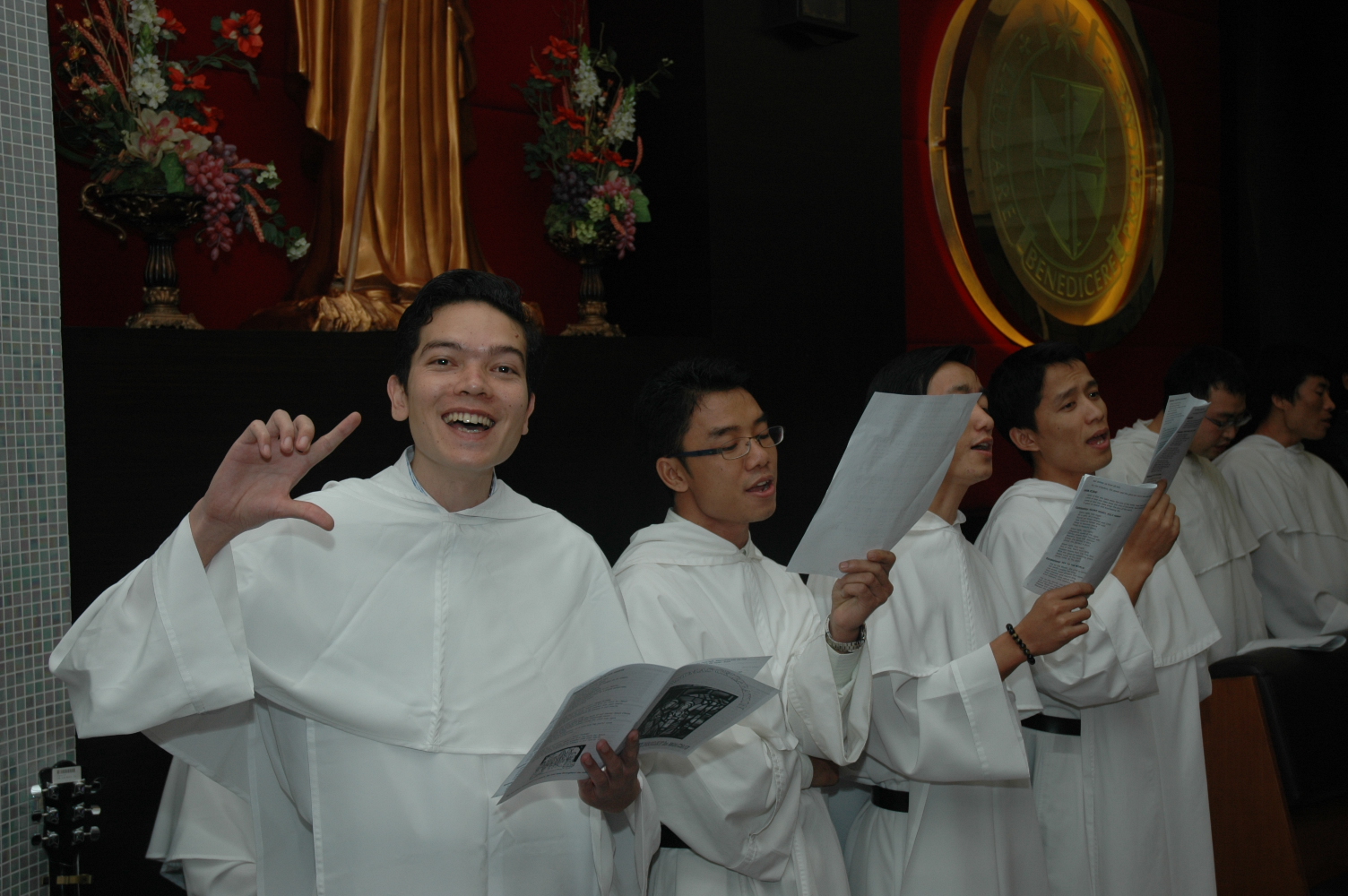
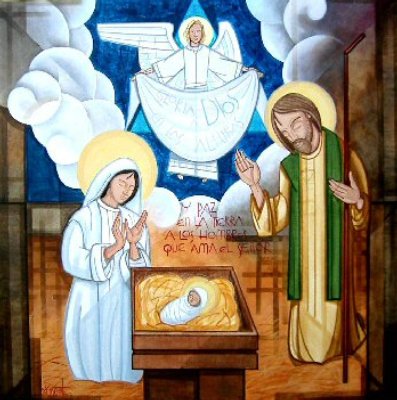
If you are sad, be glad!
Christmas is JOY.
If you have enemies, reconcile with them!
Christmas is PEACE.
If you have friends, look for them!
Christmas is ENCOUNTER.
If there are poor people near you, help them!
Christmas is GIFT.
If you have pride, bury it!
Christmas is HUMILITY.
If you have obligations, fulfill them!
Christmas is JUSTICE.
If you have sins, be converted!
Christmas is GRACE.
If you are in darkness, light your lamp!
Christmas is LIGHT.
If you have errors, reflect!
Christmas is TRUTH.
If you have hatred, forget it!
Christmas is LOVE.
. Unknown Author

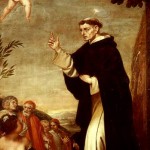
BRIEF HISTORY OF THE ORDER
Dominican Order or Order of Preachers was founded by St. Dominic of Guzman who was a man of flesh and blood walking this earth in Spain, France, and Italy. He was born in Caleruega, in Old Castile, in Spain, in 1170. Educated as a young boy by an archpriest uncle in a nearby town, he later enrolled at the University of Palencia where, after finishing six years of Liberal Arts, he followed a four-year course of Theology and Sacred Scriptures. Ordained a priest, he joined the community of Canons Regular of the Cathedral of Burgo de Osma. There, “the man of letters and the theologian lived the life of a contemplative religious, becoming a truly “vir evangelicusâ€, (Man of the Gospel). After such a thorough intellectual and spiritua l preparation, Dominic, now in his mid-thirties, was to become “vir apostolicusâ€, (an Apostolic Man); and this, not just to comply with the Pope’s orders, but as a new vocation in his life.
l preparation, Dominic, now in his mid-thirties, was to become “vir apostolicusâ€, (an Apostolic Man); and this, not just to comply with the Pope’s orders, but as a new vocation in his life.
The 12th and 13th centuries were centuries of strong faith in Europe, but they also saw the emergence and spread of heresies and witnessed their devastating effects on the people of God. One such heresy was the albigensian (so called because it was centered around the city of Albi, in the district of Languedoc, in what is now Southern France). Albigenses believed in the old Manichaean theory of two principles of creation: on good, and one evil; and, therefore, in two realms: one good (the spiritual) and the other evil (the material). They accepted part of the Scriptures and called themselves Christian. Their leaders, known as “perfectiâ€, and regarded as the pure and authentic representatives of the Gospel, lived in utmost austerity and wandered about barefoot, preaching their brand of Christianity. In the process, they disparaged the Church’s authority and many of its teachings, with the subsequent disruption of genuine Catholic life.
After getting acquainted with the teaching and ways of the Albigenses, Dominic decided to meet them on their own ground. Through public disputations on the Scriptures, Theology and Church History, he unmasked the fallacies with which the heretics confused the minds of simple people. Moreover, by going about on foot and living in total poverty, he showed that true gospel humility is not a matter of external appearance for the sake of creating an impression, but something that must come from the heart in a sincere imitation of the Lord Jesus. He was successful along the threats. However it was too much for one man. As the days went by, some young men joined him, offering their services to the mission at hand. A community of preachers was formed. With the suggestion of the Pope, St. Dominic chose the Rule of St. Augustine for his Order. Pope Honorius III gave the official name, “Order of Preachersâ€, “Dominicansâ€.
In 1216 the Order was well established. Throughout the centuries, Dominicans defended the faith of the Church and brought the true light of faith to the world, bearing their motto, “Veritasâ€, (Truth), in mind.
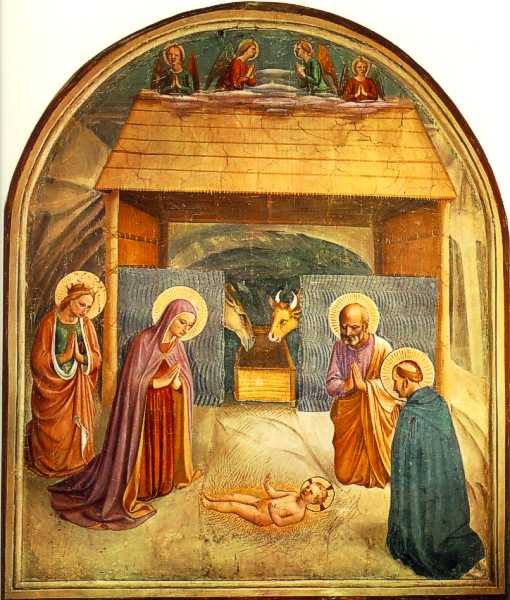
ECHOING THE WORD OF GOD:
CHRISTMAS DAY
Christ is born for us. Let us adore him.
1.    LITURDY OF THE WORD
First Reading: Is 52:7-10. “How beautiful upon the mountains are the feet of him who brings glad tidings, announcing peace, bearing good news, proclaiming salvation, and saying to Zion, ‘Your God is King’.†How beautiful it is announcing the greatest news of all, the mother of all news: Christ is born – for us! He is the Christ, or the anointed one. He is Emmanuel, or “God-with-us.†He is Jesus, or God saves. Indeed, how beautiful it is to preach the Good News to the whole creation!
Second Reading: Heb 1:1-6. In the past, God spoke in varied ways through the prophets. Today He speaks to us through his Son, who is the Word of God. The Son of God, Jesus, is the definitive Word, the final word, the totally sufficient Word (St. John of the Cross). And, as the angels worship him, we also worship him by kneeling before his Crib.
The Holy Gospel: Jn 1:1-18. “The Word became flesh and makes his dwelling among us… Of his fullness we have all received – love following love.†What an incomparable love! “God so loved the world that He gave his only begotten Son.â€Â To those who accept the Word, which is addressed to all, He empowers to become children of God. Thanks to the grace of Christ, we are children of God – dead to sin and alive in his love – and brothers or sisters to one another.
2.    MEDITATION: MERRY CHRISTMAS!
How many times have we said –and will continue to say- Merry Christmas? I say it again: May you have a Merry Christmas! What does Merry Christmas mean?
Christmas is Christ. Christ is the center of Christmas: the Child Jesus in a manger, the Child Jesus as the light of our Christmas – of our hearts. There cannot be a true Christmas without Christ. There can be no true Christmas if Christ is forgotten sidelined. The incarnation of Christ – and his resurrection – is the mystery of our faith: He became man – one like us, but without sin. Without Christ, Christmas is merely three meaningless letters: m, a, s. Truly, Merry Christmas means a happy encounter with Christ!
Christmas is love of God. It is God’s incredible love for us and our humble response to this love. How may we respond? We respond correctly by adoring the Child Jesus. Adoration ought to be our attitude through the Christmas season. It was the attitude of Mary and Joseph, the attitude of the shepherds, and the attitude of the Three Kings. Mary and Joseph kept everything in their hearts in an attitude of contemplative prayer. The shepherds knelt before the Child in the Crib. The Three Kings offered their gifts as a sign of worship. “O come, let us adore him.â€
Christmas is love of neighbor. Love of Christ in the manger entails love of Christ in the “little ones.â€Â “What you do to the least of my brothers and sisters, you do it to me.†“Only the poor, the hungry, those who need someone to come on their behalf, will have that someone. That someone is God, Emmanuel, God-with-us†(Oscar Romero). Christmas then is being closer to the poor around us and sharing something with them.
Christmas is joy. A birth in the family is always a great joy. How much more the birth of the Son of God, our brother and savior? “The Son of God is born in eternity without a mother; in time without a father, and became our brother†(John Tauler). This is yesterday, today and forever the greatest possible joy! Yes, Christmas is joy: “Joy to the world, joy to you and me.â€
Christmas is peace. The angels sung: “Glory to God in the highest and peace to men.â€Â Peace – like joy a consequence of love – means living together in justice and love, in harmony. As believers in Christ, the Prince of Peace, we are asked to be peacemakers in our communities, in our world – often an unjust and violent world. To become genuine peacemakers, we need to have inner peace: no one can give what he or she does not have. “Acquire inner peace and thousands around you will find liberation†(St. Seraphim).
3.    CONCLUSION
My co-pilgrims, may we have a Merry Christmas! That is, may your Christmas and mine be centered on Christ and permeated by love and joy and peace! Above all, may it be permeated by compassionate love for our suffering, needy, poor neighbor!
I have received a Christmas card with this message: “Christmas is any day of the year when a person approaches us and we regard him or her as our brother or sister, and treat him or her as a true brother or sister.†St. John the Evangelist tells us in the Prologue of his Gospel that we are God’s children if we accept Christ as our brother and savior. And if we are children of God, we have to accept and treat the others as our brothers and sisters in Christ.
Last September 2010, Fr. Amado Diago, a Dominican Spanish brother and a dear friend passed away in Taiwan, where he was a dedicated missionary for many years. I remember his words on a Christmas Night: “Fausto, place the Crib in your heart so that the Little One (el Pequeño) may continue growing in you.â€
May the Child Jesus be born in our hearts in a deeper way, and may those around us notice it by the way we treat them with kindness and compassion – with love.
May you all have a Merry Christmas!
FR. FAUSTO GOMEZ BERLANA, O.P.
St. Dominic’s Priory,
Macau, December 2010
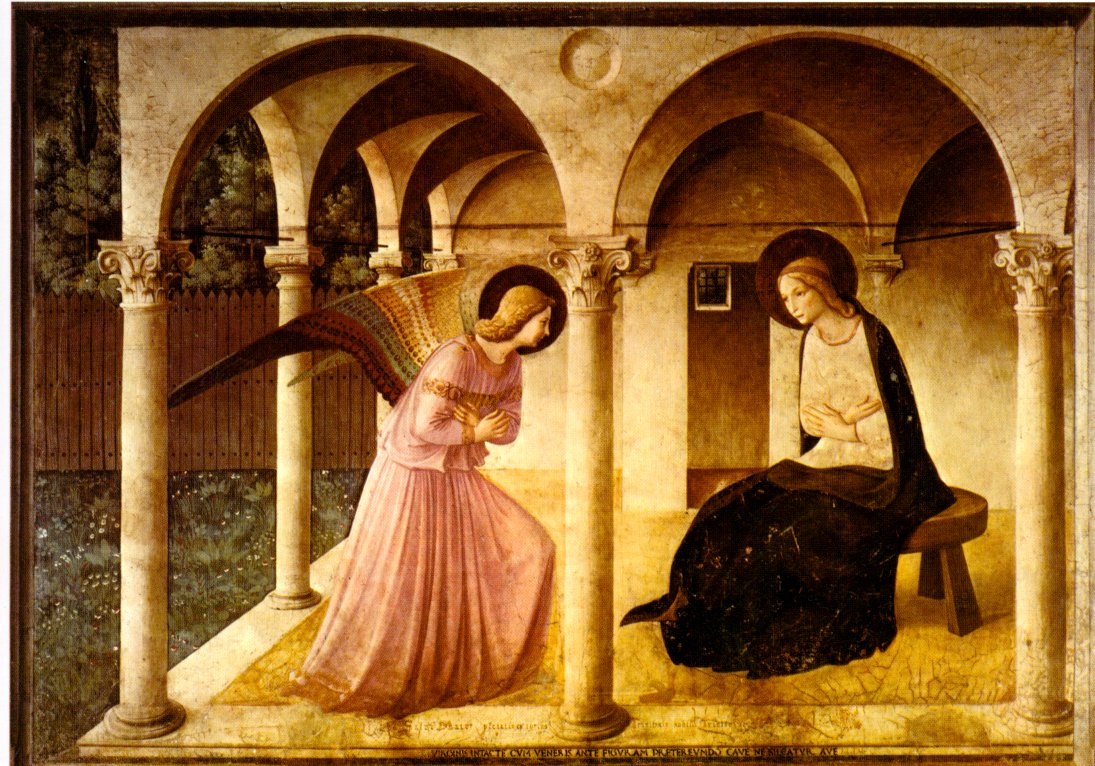
A Reflection on the Good News at Christmas (Lk 2:1-14)
On the night when Jesus was born, the angel of the Lord appeared to the shepherds in the fields, saying: “Behold, I proclaim to you good news of great joy that will be for all the people. For today in the city of David a savior has been born for you who is Christ and Lord. And this will be a sign for you: you will find an infant wrapped in swaddling clothes and lying in a manger.â€
The sign by which we are to know that our salvation is at hand is a new birth of a little child! What can be more fragile and vulnerable than an infant? What can be more dependent and helpless than an infant? However, that very vulnerability, dependency and defenselessness is a sign for us to recognize the Son of man. Perhaps we are so used to such an image of the child Jesus at Christmas that we don’t appreciate the Good News expressed in this sign. Just as someone comments that we Christians lose our shame of worshipping the naked Jesus on the cross. We are too habituated to the celebration of Christmas to feel the outrageousness of the news of God-become-man!
No one is as small, dependent and vulnerable as an infant. But that is a sign leading us to God. But here the Good News is!
People in the course of human history have relentlessly searched for God and have tried their best to describe the God that they’ve experienced. To many people, God is beyond comprehension. Nonetheless, in His self revelation to us as recorded in the Old Testament Bible before Christ, He was known as a powerful judge with many human characteristics like vengeance, jealousy and love. But now, at Christmas, the Scripture announces that God has become an infant – fragile, poor, naked and helpless.
It is not because God couldn’t do otherwise, but He wills to do so in order to become an Emmanuel – “God is with us†– and, moreover, one with us in our humanity. In other words, God loves the humanness of humankind.
The Good News is that we no longer live in fear, with a belief in a judge of wrath, who would treat us as we treat each other. On the contrary, thanks to the message of Christmas, we can live in a parent-child relationship with God, trusting that He’s always loving and forgiving. In the same way as parents love their children, no matter what they do, who they are in life or how much they earn for the family, God loves us because we are human – His children.
If the Christmas Gospel announces the Good News about God, at the same time it announces the Good News about man. The nativity of Emmanuel – “God is with us†– has restored the relationship between God and man, and confirmed that we are the image of God on earth. We read in the catechism (CCC. 78) that, “For this is why the Word became man, and the Son of God became the Son of man: so  that man, by entering into communion with the Word and thus receiving divine sonship, might become a son of God.”
In our daily life, very often we judge and treat one another according to our appearance, talent, social status, wealth and influence.
So, how about the poor and needy? How about the underprivileged and unfortunate? How about the unknown and unvoiced? How about the children and unborn babies? Where are they in the social ladder? Is it because those people have yet to have any position on earth that their dignity is not recognized and respected properly? Is it the reason why many unborn babies have been aborted and humble people marginalized?
Here, the Christmas Gospel is the Good News about humankind: For God has become man, man’s dignity is not any longer defined by appearance, talent, status, wealth or influence. A person has dignity simply because she or he is a human being. To be human is to be the image of God since God has put on our humanity.
The Christmas Gospel is therefore the Good News about God, about humankind and remains Good News for every generation. Luke didn’t announce that Good News for his own contemporaries, but for all time, “for today,†for us, and now he would vibrantly announce to us the same message.
As long as the world is still in the darkness of fear or ignorance of God, the message of Christmas is necessary! As long as the transcendence of God is constrained in merely human vision and the condescension of God in human form is ignored and misunderstood, the message of Christmas is necessary! As long as people’s dignity is labeled merely by human values, from which its consequences are discrimination, exploitation, suppression, distain of the underprivileged and many other forms of “kiss-up kick-down,†etc. the Good News of Christmas still needs to be made more present, the Good News of today and for today!
So, our attitude towards Christmas should be that of the shepherds when they said, “Let us go, then, to Bethlehem to see this thing that has taken place, which the Lord has made known to us.†We today also say to each other the same thing or even in a more joyful manner, “O come all ye faithful!†Yet today’s “going to Bethlehem†doesn’t simply mean going to the crèche or to the cave of nativity modeling the scene of Jesus’ birth or even to the real Bethlehem in Israel. It is the opening of our heart to receive the Good News about our Lord and about ourselves, and treasure it and practice it in our life. Let the Christmas Gospel move our heart to find the infant Jesus among the poor, the outcast and the marginalized. In this way, the hymn of praise “Glory to God in the highest and peace to man of good will on earth†will no longer be on our lips only but also in our heart. The mystery of the Incarnation takes a central place in Christianity. If we are unable to meet God in human form, hardly we live our Christian faith in its strict meaning. If we fail to encounter God as a fellow human being, there is no point for us to be a Christian. If we proclaim at Christmas that God has become man while we wish to become a superman, it would be so hypocritical of us! May the joy of Christmas not overwhelm the Good News about God and about man. May our celebration of the holidays renew our faith and make it as alive and vibrant as God himself intended it to be. Amen!
by Peter Thoại

 For us Christians, the first day of a New Year calls our attention to three points: the New Year, the World Day of Peace and the Feast of Mary as Mother of God.
For us Christians, the first day of a New Year calls our attention to three points: the New Year, the World Day of Peace and the Feast of Mary as Mother of God.

